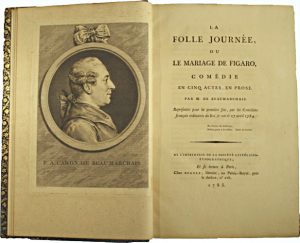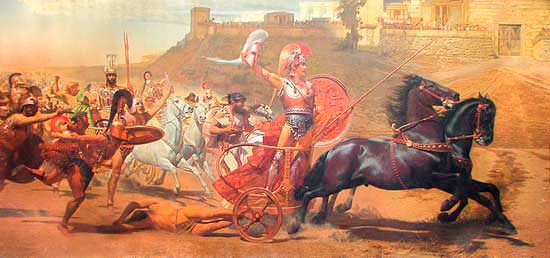Beaumarchais The Marriage of Figaro
 Exceptional success fell on the second part of the Beaumarchais comedy trilogy – “Mad Day, or the Marriage of Figaro”. (For the first part – see “The Barber of Seville” – analysis.)
Exceptional success fell on the second part of the Beaumarchais comedy trilogy – “Mad Day, or the Marriage of Figaro”. (For the first part – see “The Barber of Seville” – analysis.)
Before us is Figaro again. But now it is no longer the Barber of Seville, arranging the love affairs of a young aristocrat. Managing the castle of Count Almaviva, he now comes into conflict with his master.
Count Almaviva is outlined by features typical of the nobles of that era. He was already bored with Rosina, who Figaro helped him to conquer in his time. Everyone in the castle is known for its levity and licentiousness. He cares for the gardener’s little daughter Fanshetta, he is trying to seduce Suzanne, Figaro’s bride. On his side is power and authority.
Almaviva, however, is depicted not so much as a villain, as a petty and insignificant person in the impulses and actions.
Intelligent and energetic Figaro confronts him as a man of the people, as a representative of the new era, which is replacing the “old order”. Retaining outward deference, he deeply despises this aristocrat.
“You consider yourself a great genius, because you are a grandee! .. Greatness, wealth, position, high positions – these are the sources of such arrogance! What have you done to have so many benefits? Your only difficulty was to be born. In fact, you are a rather mediocre person, while I, damn it, lost in a dark crowd, I only had to show more knowledge and acumen than have been spent for a hundred years to manage all of Spain just to feed myself. And you want to be with me! .. ”- this is the famous monologue of Figaro, exaggerated and pompous.
When the count tells Figaro that he could advance in the service because of his ability and intelligence, Figaro responds: “Will you advance thanks to your intelligence? Your Excellency, laugh at me. Be mediocre, cringe and achieve everything. ”
In the twelfth scene of act III of the comedy, a picture of the then court is given. The stupid, stuttering judge Bridwason cannot understand what is wanted of him. The plaintiff (Marceline) impatiently exclaims: “What is it? How will you judge us? ”Bridwason’s answer is characteristic:“ Why did I buy my position? ”The position of the judge was sold at that time, and neither personal abilities, nor moral qualities, nor legal knowledge played a big role. “And the law,” says Figaro, “is lenient towards the powerful of the world and stern towards the small people.”
Delivered in April 1784, five years before the French revolution, the comedy of Beaumarchais aroused delight. The audience applauded not so much the play of the actors as it was in line with the then ideological fashion replicas of Figaro. Even noble people in theaters laughed when the “clever plebeian” won over the graph represented on the stage.
Excessive educational optimism received from Beaumarchais one of the most striking incarnations. Alas, the further course of the French revolution with its bloody terror completely dispelled most of the “philosophical” illusions about the “humanism of the common people”, about the spiritual superiority of the plebs over the nobility, about the indisputable advantages of democracy over the monarchy.



